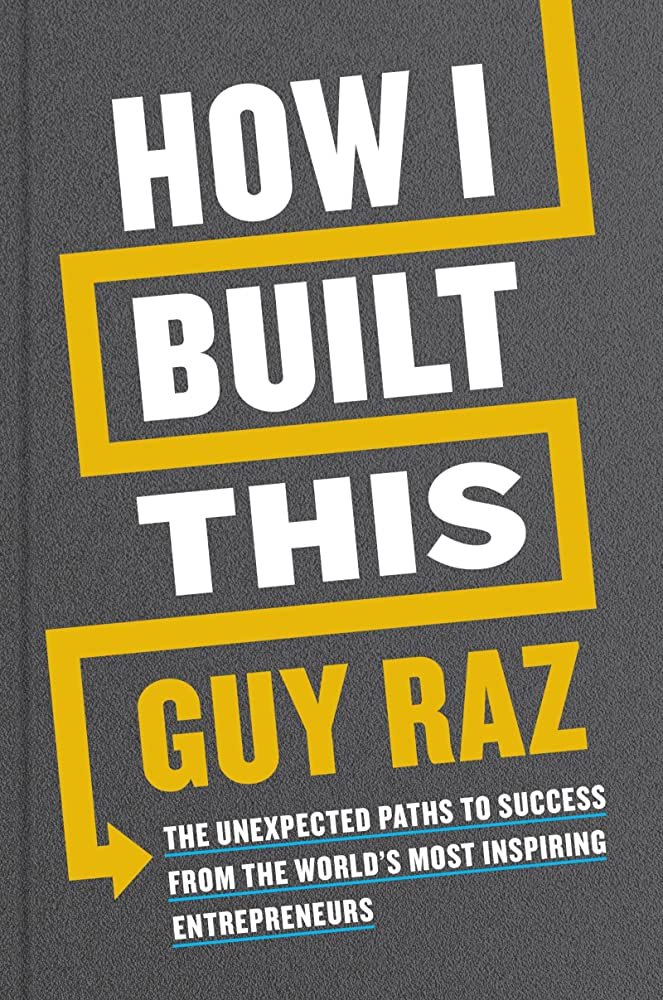How I Built This by Guy Raz
Date read: 3/1/23. Recommendation: 7/10.
Based on Guy Raz’s podcast of the same name, this book shares insights from some of the world’s top entrepreneurs on building, launching, and scaling their ideas. Great chapters on identifying risk, extending your runway, harnessing the power of your story, and being deliberate about your location.
Check out my notes below or Amazon for details and reviews.
My Notes:
Scary versus dangerous:
“One of the things we taught people to do was rappel off a cliff. It is a very scary thing to do, but you are also held by a belay rope, and that rope would hold a car. So walking off the cliff backwards is scary, but it’s not dangerous. Walking across a thirty-five-degree-angle snowfield on a beautiful late May afternoon with bright blue sky, on the other hand, is not scary at all, but it is very dangerous, because the snow is melting, eventually it is going to find a layer of ice, the water will lubricate that ice, and then you have an avalanche. That is dangerous but not scary.” Jim Koch
“In my situation, staying at BCG that was dangerous but not scary. The danger was continuing to do something that didn’t make me happy and getting to sixty-five years old looking back and going, ‘Oh my God, I wasted my life.’” Jim Koch
“Failing is scary. Wasting your life is dangerous.” Guy Raz
Michael Dell on the origins of Dell Computer Corporation: There was nothing dangerous about his idea, he loved working on computers. He knew them inside and out. The reality was the scariest thing about starting the business—the unknown. “The danger for Michael was in relenting to his parents’ demands that he become a doctor, in hating every waking second of it while he watched the personal computing revolution unfold in front of him, and then in resenting his family for the rest of his life because they pushed him down a path that he knew in his heart was wrong for him.” Guy Raz
Safety nets:
Herb Kelleher, co-founder of Southwest Airlines, didn’t give up his law practice until 1981—fourteen years after founding Southwest. Draymond John continued to work at Red Lobster for six years after he started FUBU, only after he secured a multi-million dollar round of financing. Both used their jobs to create runway for their ideas.
Avoid catastrophe: “By doing things smartly and safely like this, you’ll give yourself more time and more room to operate, while simultaneously reducing the chances that failure can ruin your life.”
Never be unprepared:
Each founder that Raz highlights in his book has one thing in common: they’ve done their homework. They know their product, business, customers, and industry inside and out. And this gives them a deep confidence in the viability of their ideas.
“They knew their ideas would work because they knew their stuff.”
The role of research for artists and entrepreneurs is the equivalent of practice for athletes or rehearsal for actors. “It’s deep work and repetition that sear the fundamentals into your muscle memory….so when the lights come on and it’s time to do something for real, you can put all that prep work away and just act or play or build. You can create freely, without reservation or hesitation.” Guy Raz
Relationships:
“My best business decisions really have to do with picking people. Deciding to go into partnership with Paul Allen is probably at the top of the list…Having somebody who you totally trust, who’s totally committed, who shares your vision and yet has a little bit different set of skills, and also acts as a check on you—and just the benefit of sparking off of somebody who’s got that kind of brilliance—it’s not only made it fun, but it’s really led to a lot of success.” Bill Gates
Know your story:
“The story must explain at a fundamental level why you exist.” Ben Horowitz
“The basic story that answers the big ‘why’ questions is the one that creates loyal customers, finds the best investors, build an employee culture that keeps them committed to the venture, and keeps you committed and grinding away when things get real hard and you want to give up (and you will).” Guy Raz
Location matters:
Three different approaches to location: moving in order to break into your industry, moving in order to break out of your industry, or staying put right where you are. What matters is that you’re intentional in that decision.
Master your craft:
“Whatever you do, do it well. Do it so well that when people see you do it, they will want to come back and see you do it again, and they will want to bring others and show them how well you do what you do.” Walt Disney

